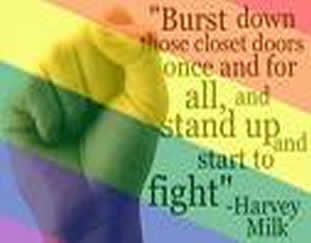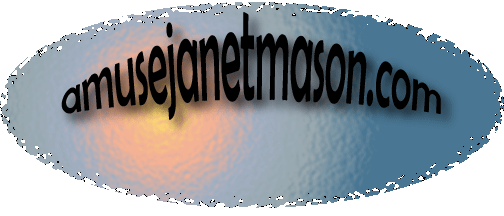Tea Leaves: a memoir of mothers and daughters by Janet Mason (Bella Books April 2012) is now available -- click here for more info
Harvey Milk -- then and
now
amusejanetmason.com
by
Janet Mason
This audio commentary was aired in honor of Harvey Milk's birthday May 22nd on This Way Out,
the LGBT syndicated international radio program.
Click here for audio.
“There is something here for everyone who has ever loved someone else or plans to. I highly recommend “Tea Leaves” just because it is so real and so beautifully written.”–Reviews by Amos Lassen
read Janet Mason's latest piece in The Huffington Post --Chick-fil-A: What Would Gandhi Do If He Were Gay?
|
Harvey
Milk was assassinated in 1978, my first year of college. I have a dim
memory of the news accounts at the time, possibly because it was not a
headline story in the mainstream media. I did not come out until I was
23 -- call it denial or survival, I was not consciously aware of my sexual
orientation until then. When I left the suburban working class tract house
development of Levittown, Pa., where I had grown up, I wasn't yet out
-- but I instinctively moved to the nearest large city. A few years after
I had left, a young gay man named Anthony Milano who lived in the same
neighborhood where I grew up was brutally murdered. This was the
first reported anti-gay hate crime murder, tried as such.
|
Share on Twitter
 The
first time I saw a movie about Harvey Bernard Milk, it was 1984 and I had a
ticket for the premier showing at the Roxy movie theater on Sansom Street in
Philadelphia. I was twenty five and had come out a few years before. For some
reason--maybe I only had one ticket -- I went to the premier alone. I remember
standing in line outside the theater with a number of gay and lesbian community
luminaries, including Barbara Gittings, the lesbian activist who died last year,
and her long-time partner, Kay Tobin Lahusen. Barbara's long list of victories
include being part of the movement to get the American Psychiatric Association
to drop homosexuality as a mental illness in 1972.
The
first time I saw a movie about Harvey Bernard Milk, it was 1984 and I had a
ticket for the premier showing at the Roxy movie theater on Sansom Street in
Philadelphia. I was twenty five and had come out a few years before. For some
reason--maybe I only had one ticket -- I went to the premier alone. I remember
standing in line outside the theater with a number of gay and lesbian community
luminaries, including Barbara Gittings, the lesbian activist who died last year,
and her long-time partner, Kay Tobin Lahusen. Barbara's long list of victories
include being part of the movement to get the American Psychiatric Association
to drop homosexuality as a mental illness in 1972.
Inside the small but cozy
theater, the audience was comprised mainly of gay men, with a few pockets of
lesbians here and there. The Times of Harvey Milk opened with Diane Fienstein,
as the first female President of the San Francisco Board of Supervisors, announcing
that San Francisco City Supervisor Harvey Milk and Mayor George Moscone had
been assassinated. As the documentary progressed, with the narration of Harvey
Fierstein, one of the few openly gay actors at the time, I became aware of an
usual sound coming from all around me.
I realized, then, that
it was the sound of men, sitting in the dark, softly crying.
In those days my activist
life was divided into two camps, women's liberation -- which is where most of
the lesbians were -- and the gay movement, at that time still predominantly
men. Often, I was the person who brought the two groups together. I invited
Frank Broderick, the then editor of the Philadelphia gay and (newly added since
I had begun writing for them) lesbian newspaper, the now defunct, Au Courant,
to come speak to a feminist collective I was working with.
Frank wanted to know what
the little double-sided axe was that one of the women wore on a chain around
her neck. He had seen other lesbians wearing this. We explained to him that
it was a labyris, a symbol of female strength and independence from pre-patriarchal
Minoan times. (There were a few Seven Sisters alumn in the room.) Frank was
usually very quiet, with a deadpan look on his face, but I imagine he was has
having a good laugh inside. I would never find out how he felt about the meeting,
since he died of AIDS in the next six months or so, a swift and sudden casualty
of the first stage of the epidemic.
The members of my feminist
newspaper collective, (the now defunct newspaper was titled Labyrinth -- yes,
the Labyrinth were the original labyris was found) -- were offended by the name
of Frank's T&A column in Au Courant. With a glint of humor
in his eye, he insisted that the T&A graphic stood for Tidbits and Advice.
Of course, there was a double entendre -- and, of course, most gay men would
have found it funny. Today, most lesbians would find it funny also. But times
were different then. We were still on the heels of a feminist revolution that
made it possible for women to have equality and, therefore, to be independent
from men -- hence the slogan, 'A woman without a man is a fish without a bicycle.'
I saw Milk
over the holidays -- and watched it back to back with the original documentary.
Milk, the movie, came across as well-done fictionalized version of the
documentary -- with some original archival news footage and an opening scene
of gay men being led out of a bar and put into a paddy wagon -- the historic context
of our gay lives.
Sean Penn plays a convincing,
although stereotypically "gayer," Harvey Milk. One of the most poignant
scenes in the movie is when Harvey receives a telephone call from a gay teen
in a small town in the Midwest, saying he was going to kill to himself but then
he saw Harvey on television. Before the conversation was cut off, Harvey manages
to tell the young person to move to the nearest city.
Harvey Milk was assassinated
in 1978, my first year of college. I have a dim memory of the news accounts
at the time, possibly because it was not a headline story in the mainstream
media. I did not come out until I was 23 -- call it denial or survival, I was
not consciously aware of my sexual orientation until then. When I left the suburban
working class tract house development of Levittown, Pa., where I had grown up,
I wasn't yet out -- but I instinctively moved to the nearest large city (advice that Harvey gave to the young people who called him from samll towns across the country). A few
years after I had left, a young gay man named Anthony Milano who lived in the
same neighborhood where I grew up was brutally murdered. This was one of the
first reported hate crimes.
I really didn't know much
about Harvey Milk when he was living. I have never been to the Castro (Harvey was the unofficial Mayor of Castro Street), the 1970s Mecca for gay men.
But Harvey Milk is my hero, too, and so is Anthony Milano who was so bravely
himself in a redneck neighborhood that I had to flee before coming out. We might
still have some differences, but today gay men and lesbians are working together
-- and we are a force to be reckoned with. It's true, we've had our recent setbacks
-- it often feels like the proverbial one step forward and two steps back but
we are, in fact, still marching.

 The
first time I saw a movie about Harvey Bernard Milk, it was 1984 and I had a
ticket for the premier showing at the Roxy movie theater on Sansom Street in
Philadelphia. I was twenty five and had come out a few years before. For some
reason--maybe I only had one ticket -- I went to the premier alone. I remember
standing in line outside the theater with a number of gay and lesbian community
luminaries, including Barbara Gittings, the lesbian activist who died last year,
and her long-time partner, Kay Tobin Lahusen. Barbara's long list of victories
include being part of the movement to get the American Psychiatric Association
to drop homosexuality as a mental illness in 1972.
The
first time I saw a movie about Harvey Bernard Milk, it was 1984 and I had a
ticket for the premier showing at the Roxy movie theater on Sansom Street in
Philadelphia. I was twenty five and had come out a few years before. For some
reason--maybe I only had one ticket -- I went to the premier alone. I remember
standing in line outside the theater with a number of gay and lesbian community
luminaries, including Barbara Gittings, the lesbian activist who died last year,
and her long-time partner, Kay Tobin Lahusen. Barbara's long list of victories
include being part of the movement to get the American Psychiatric Association
to drop homosexuality as a mental illness in 1972.
